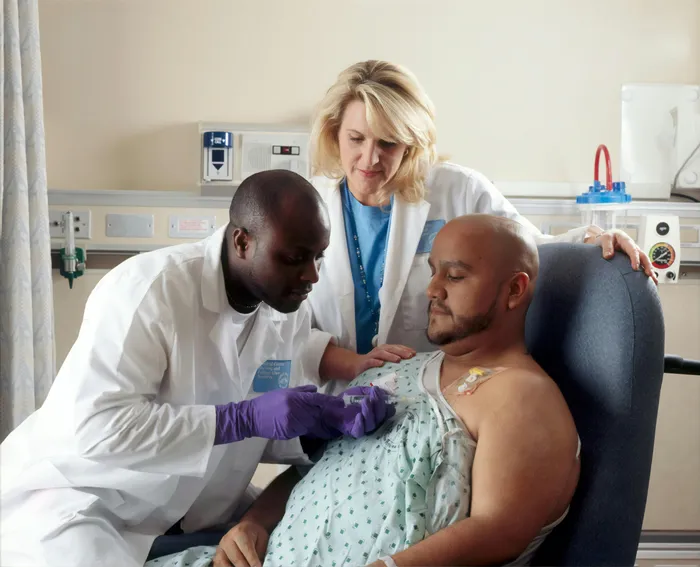Prostate cancer awareness: lessons from Joe Biden's diagnosis every man should know
MEN'S HEALTH

Doctors are examining a man in a hospital.
Image: Unsplash
Reports emerged on Friday revealing that former US President Joe Biden has been diagnosed with an aggressive prostate cancer that has metastasised to his bones.
This startling news, following a doctor's visit for urinary issues, has generated widespread concern both domestically and internationally, highlighting the critical importance of men's prostate health.
And while it is "not uncommon" for men in their 80s to be diagnosed with prostate cancer, Dr Ryan Cleary, a urologist at MedStar Health, told the BBC that the grade and stage of Biden's cancer are "more advanced than most men would encounter" at diagnosis.
Meanwhile, prostate cancer is a significant health concern among men worldwide; in South Africa, it stands as the most commonly diagnosed cancer.
Statistics reveal that one in every 15 men is estimated to be diagnosed with prostate cancer over their lifetime - a stark reminder of the urgent need for awareness and early detection, particularly among higher-risk groups.
Here's what you need to know about prostate cancer and its treatment options.
Understanding prostate cancer
The prostate, a small gland located below the bladder, plays a crucial role in the male reproductive system by producing seminal fluid that nourishes and protects sperm.
While many men will experience non-cancerous prostate conditions like benign prostatic hyperplasia (BPH) or prostatitis, prostate cancer poses a more serious threat.
In many cases, prostate cancer develops silently, often growing slowly in its early stages.
However, if left unchecked, it can metastasise and become life-threatening.
The complexities surrounding the disease highlight the importance of men adopting proactive health management, especially as they age.
Meanwhile, the American Cancer Society estimates that there will be more than 300,000 new cases in the US this year. They added that about one in eight men will be diagnosed with prostate cancer during their lifetime.
Prostate cancer in South Africa
In South Africa, prostate cancer accounts for a substantial percentage of male cancer deaths, particularly affecting black men who are at a higher risk.
They are often diagnosed at a younger age and are more likely to experience aggressive forms of the disease.
This demographic reality underscores the importance of targeted awareness campaigns and screening initiatives.
Organisations such as the Prostate Cancer Foundation of South Africa are actively working to combat the stigma and ignorance surrounding prostate health by offering education and resources to men across the nation.
Recognising the risks
As pointed out by Murray Hewlett, the CEO of Affinity Health, "Prostate health is not something men should wait to think about when there’s a problem."
Several risk factors, including advancing age (particularly over 50), family history of the disease, and African ancestry, significantly elevate one's chances of developing prostate cancer.
Important signs and screening
Many men may neglect health check-ups due to the assumption that symptoms are absent, which can be a grave misjudgment.
Prostate issues may not exhibit noticeable symptoms in their early stages, but when they do appear, they can include:
- Frequent urination, particularly at night.
- Difficulty initiating or stopping urination.
- Weak or interrupted urine flow.
- Pain or burning sensation during urination or ejaculation.
- Presence of blood in urine or semen.
- Chronic pain in the lower back, hips, or pelvis.
While these symptoms may indicate non-cancerous conditions, they should never be dismissed.
Screening is vital, especially for those at heightened risk.
It is recommended that men begin regular screenings at age 40, which typically include a Prostate-Specific Antigen (PSA) blood test and a Digital Rectal Exam (DRE).
Tackling the myths
Myths surrounding prostate health can perpetuate silence and inaction. Some common misconceptions include:
Myth: Only older men need to worry about prostate health. Fact: Changes can begin in men’s 40s, especially with a family history.
Myth: Screening is painful or embarrassing. Fact: PSA tests are simple blood tests, and DREs are quick and routine.
Myth: No symptoms mean no problem. Fact: Prostate cancer often develops without noticeable symptoms in the early stages.
Treatment and lifestyle recommendations
Receiving an early diagnosis can significantly influence treatment outcomes.
Treatment options for prostate cancer range from medication to shrink the prostate to radiation therapy or surgery for more advanced cases.
Active surveillance is also becoming an increasingly common approach for slow-growing forms of prostate cancer.
Moreover, adopting healthy lifestyle choices can play an essential role in mitigating risks.
Maintaining a balanced diet rich in fruits, vegetables, and healthy fats, while limiting red meat and processed foods, can be beneficial.
Staying physically active, managing weight and blood pressure, and avoiding smoking and excessive alcohol consumption further contribute to optimal prostate health.
The path forward
As prostate cancer continues to represent a significant health threat, men must take action by prioritising their prostate health.
Early detection and treatment improve survival rates significantly.
The message from health advocates is clear: do not wait for symptoms to manifest before seeking a check-up.
“We encourage men to speak up about their health, take control early, and not wait for symptoms to become serious," concludes Hewlett.
Booking that simple check-up could ultimately pave the way for a longer, healthier life.
As we wait for further updates on President Biden's health, his diagnosis serves as a crucial reminder of the need for increased awareness around prostate cancer.
Too many men avoid necessary screenings, often until it’s too late.
With greater knowledge and proactive approaches, prostate cancer can be effectively managed, ensuring men can lead vibrant, healthy lives.
Related Topics:
